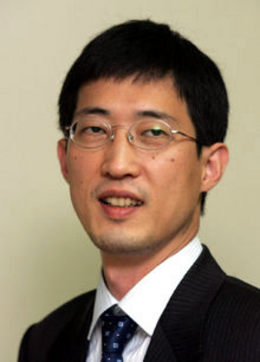Posted on : Oct.28,2006 17:20 KST
Modified on : Oct.30,2006 15:47 KST
Park Yong-hyoun, Metro Desk Head
"Hi! Congratulations! I hear the new United Nations Secretary-General is from your country. So, tell me about that Mister Ban."
I've been getting a few emails from young civil rights lawyer friends from overseas asking about Minister of Foreign Affairs and Trade Ban Ki-moon, who was recently elected as the next U.N. Secretary-General. Before telling them about Minister Ban, however, I found that I need to explain a little about South Korea.
South Korea is among the countries that, along with the U.N. Charter, does not all that much respect the U.N. Universal Declaration of Human Rights, one of the single most important of international agreements. Among the treaties based on the universal declaration is the International Covenant on Civil and Political Rights, and you only have to take a short look at South Korea today to see that we have neglected our obligations as a signatory nation. Each of such nations is supposed to submit regular reports on their domestic human rights situations for review by the U.N., which is then supposed to recommend ways to make improvements. After reviewing Korea's report in 1999, the U.N. -- and not for the first time -- told Korea to gradually phase out the National Security Law (NSL). Seven years later, however, the NSL remains unscathed. The committee that reviews country reports also said Korea was putting too many restrictions on the right to free assembly, citing Article 12 of the Law on Assemblies and Demonstrations, which concerns public assemblies on main urban roads. Article 12 has been revised, but instead of being changed to allow proper freedoms, it restricts public assemblies even more than it used to.
The U.N. has taken issue with specific human rights questions in South Korea, as well. No fewer than six cases have been cited by the U.N. Human Rights Committee for violations. In 1995, the U.N., regarding the 1991 conviction of Son Jong-kyu for "third party involvement" in the Daewoo Shipbuilding strike, told Korea is should issue compensation to Son because his conviction was in violation of U.N. guarantees on the freedom of expression. It was only 10 years later, in 2005, that the Korean government responded, saying that Son's lawsuit for compensation by the state had been rejected by the court.
Regarding most cases, formal U.N. recommendations have been quite different from the findings of Korean courts and even the Constitutional Court, because the U.N. human rights agreements Korea has signed are not applied as law. The impression you get, actually, is that Korea's legislative, executive, and judicial branches just don't take human rights agreements seriously. A report commissioned by the National Assembly's Legislative and Judiciary Committee said the Assembly "needs a formal device in place that eliminates conflict between legal interpretation and U.N. recommendations." It suggested that Korea refer to U.N. recommendations in the course of interpreting law relating to human rights, to allow for appeal in a case if the U.N. arrives at a verdict which differs from the Korean one, or that the government give compensation when recommended to do so by the U.N.
That, however, would not be solving everything. There are several international human rights agreements that Korea has yet to join. Korea -- finally -- became the 24th country to sign the optional protocol to the Convention against Torture and Other Cruel, Inhuman or Degrading Treatment or Punishment. The protocol requires that countries establish agencies to watch for and prevent torture and cruel treatment and that the employees of such agencies have the authority needed to "carry out independent duties." Recently the National Human Rights Commission said the extremely obvious, which was that it should be the agency that assumes that role. The response from some quarters in South Korea was that the human rights commission is trying to turn itself into an organ of the state power apparatus. That's just pathetic.
Writing back to my foreign friends, I had to tell them that it was in such a country that Minister Ban rose to recognition as a bureaucrat, but that, at least to the degree I myself can remember, he has never done anything significant in terms of trying to do something about the human rights situation here. In response, I got yet another e-mail from someone in Africa, which is where current U.N. secretary-general Kofi Annan comes from. Muthee Kiunga, a human rights lawyer in Kenya, asked if maybe someone was trying to turn back what had been accomplished by Secretary-General Annan, who has emphasized human rights in all U.N. activities. His question, perhaps, was one not just Minister Ban needs to answer, but South Korean society as a whole.

